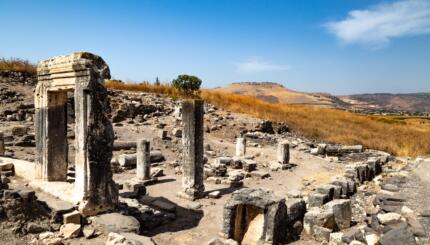Tisha B’Av is the day when the Temple in Jerusalem was destroyed. Twice. The entire day is a sort of exercise in sleepwalking: you don’t know where you’re going, or what you’re supposed to be doing. There are more things that you’re not allowed to do (eating, wearing leather or wearing new clothes, listening to music, smiling, laughing, having joyful conversations, learning anything Jewish except for stuff that relates to mourning) than the things you are supposed to be doing (mourning).
Just in time for the day, the Orthodox Union has just released a new edition of the Tisha B’Av Kinot, in a matching edition to the Koren Sacks Siddur that set the Jewish prayerbook world on fire. (Lest you ask, “How hard is it to set the Jewish prayerbook world on fire?”, let me just tell you, this is an incendiary community — imagine reading the same book every day of your life, for up to 2 hours of every day, and that’s the amount of passion that comes out of adapting a new daily prayerbook.)
A brief word for the book-heads: This edition is super nice, with the text spaced out on the page, large and (for the most part) easy to read. They’ve corrected some of the problems that plagued the Koren — this book has thicker paper, easy instructions, and a layout that matches the English and Hebrew across the pages more cleanly and exactly.
And now, the dish. This edition trades up commentators: Rabbi Lord Dr. Jonathan Sacks, whose translation and commentary made the Koren Siddur so superb, is replaced by Rabbi Joseph B. Soloveitchik, one of the visionaries who combined philosophical and ideas with practical and applied Judaism. Rav Soloveitchik didn’t actually write this book — it’s compiled from his teachings and speeches — but the adaptation is smooth and breathless, and the meaty paragraphs are flowing, almost conversational. The commentary isn’t in that two-line style at the bottom of the page that merely informs you that birds is a metaphor for Torah scrolls or something like that, but where the commentary functions as its own text. It’s way more headstrong and less breezy than regular morning prayers, but it fits exceedingly well with the pace of the day. Where do you have to run to? Sit down. Read these prayers. Then read the commentary. Then think about it.
The meatiest part of the Tisha B’Av service is the kinot, or mournful poems. There are a bunch of traditional kinot, and more have been added as we go along and more bad stuff happens to Jews. These kinot commemorate everything from the Jews killed in the Crusades and the Spanish Inquisition to the Holocaust and genocides all over the world. This collection includes all of the Talmudic and medieval kinot, along with some newer ones. For instance, it’s neat (wrong word, I know, but still fascinating) to see a memorial poem written by the current Bobover Rebbe about the Holocaust alongside thousand-year-old elegies to the victims of the Crusades or the pogrom in York, England. The layout is likewise suitable — the commentary comes after each kinah, so you can read straight through, skip around, or just pay attention to the kinot themselves if you’re falling behind.
Tisha B’Av is a day when everything is sort of wonky. We pray in undertones, wear tefilin at sundown instead of sunrise, eat ashes, and say some of the morning prayers in the afternoon. I always used to just pray out of my regular prayerbook, hoping that I paid attention to the special directions for the day, but I’m excited to have this edition to walk me through. So why not buy this book? The only argument I can think of comes from Shlomo Carlebach, who gives over this story:
Every year Reb Avrahamle Cherchanover would buy a new copy of “kinot” for Tisha B’Av. After Tisha B’Av, he would put it away, saying, “Since the Messiah is coming this year, we won’t need to say kinot again next year.”
So, yeah, I’m pretty wowed by this edition of the Tisha B’Av service. But I’m still hoping the Messiah will show up and I won’t have to use it.


